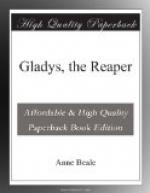Rowland Prothero knelt down, and took her up gently in his arms, Miss Gwynne assisting. The poor girl unclosed her eyes, and looked wistfully at the face that was bending over her.
’You are with friends, and in God’s hands,’said Rowland gently, as the eyes languidly reclosed.
He carried her upstairs to his brother’s room, and having placed her on the bed, left her to the care of his mother and Miss Gwynne.
Whilst they were employed in getting her into bed, a house-servant came to say that Miss Gwynne was wanted. She found a footman awaiting her, who told her that his master had sent him in search of her, and was in a state of great anxiety about her. She ran up to Mrs Prothero for a few minutes.
‘Really papa is too absurd, too provoking,’ she said with a vexed voice; ’he has sent after me again, and I am sure he must know I am here. Let me hear if I can be of any service, Mrs Prothero; I will send anything in the way of medicine or nourishment. Good-bye, I will come again to-morrow.’
‘Mr and Mrs Prothero, the Vicarage, come to-morrow,’ said Mrs Prothero.
’Yes, they are to dine with us on Wednesday, and told me they meant to sleep here. Good evening. Dear me, how wretched that poor girl looks.’
Miss Gwynne was soon hastening homewards, heedless of the splendid sky above, or the glowing fields beneath. She was making reflections on the excellence of Mrs Prothero, the silliness of Netta, the precision of Rowland, and the misery of the girl Gladys. Thence she turned her thoughts upon herself, and suddenly discovered that she had been too decided in at once ordering any person to the workhouse, without at first knowing the case.
’But it is no wonder that I am too decided sometimes, when my father is so dreadfully weak and vacillating,’ she said to herself; ’indeed I do not think, after all, that one can be too decided in this irresolute world.’
This very decided young lady is the only child and supposed heiress of Gwynne of Glanyravon, as her father is usually called. She is an aristocratic-looking personage, with a certain I-will-have-my-own-way air, that you cannot help recognising at once. She is rather taller than most tall women, and the tokens of decision in her carriage, eyes, voice, and general deportment would be disagreeable, but for the extreme grace of her figure, the unaffected ease of her manner, and the remarkable clearness and sweetness of her voice. She is handsome, too, with a noble forehead, sensible grey eyes, glossy chestnut hair, and a very fine complexion. The many of her nominal friends and admirers who at heart dislike her, prophesy that in a few years she will be coarse, and say that she is already too masculine; but the few who love her, think that she will improve both in person and mind, as she rubs off the pride and self-opinionativeness of twenty years of country life against the wholesome iron of society and the world. But we shall see.




